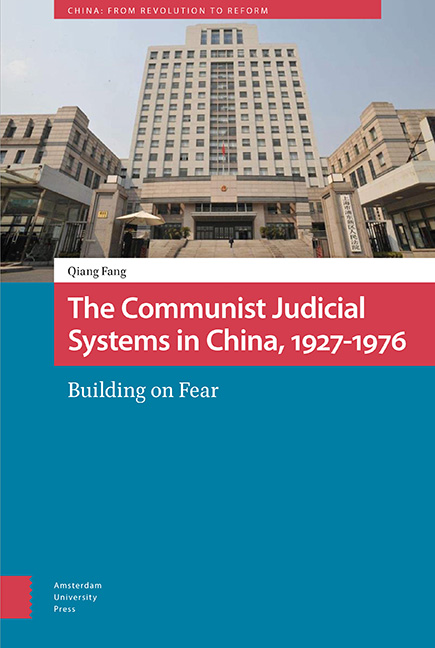Book contents
- Frontmatter
- Contents
- List of Tables
- Dedication
- Acknowledgement
- Acronyms
- Introduction: Building on Fear
- 1 Born in Blood: Origin of the Communist Judicial System in China, 1927–1935
- 2 Cornerstone or Aberration?: The Communist Judicial System during Wars with Japan and the GMD, 1936–1949
- 3 From “Excessive Lenience” to Harshness: The Communist Judicial System in the Early PRC, 1949-1952
- 4 A Deliberate Purge: Legal Reform in the Early PRC, 1952-1953
- 5 A Golden Age?: The Communist Judicial System in China, 1953-May 1957
- 6 The Great Leap of Law: The Communist Judicial System in China, 1957-1965
- 7 Not the Worst Period of Law: The Communist Judicial System in the Cultural Revolution, 1966-1976
- Conclusion: From Party’s Fear to People’s Fear
- Bibliography
- Index
Conclusion: From Party’s Fear to People’s Fear
Published online by Cambridge University Press: 18 June 2021
- Frontmatter
- Contents
- List of Tables
- Dedication
- Acknowledgement
- Acronyms
- Introduction: Building on Fear
- 1 Born in Blood: Origin of the Communist Judicial System in China, 1927–1935
- 2 Cornerstone or Aberration?: The Communist Judicial System during Wars with Japan and the GMD, 1936–1949
- 3 From “Excessive Lenience” to Harshness: The Communist Judicial System in the Early PRC, 1949-1952
- 4 A Deliberate Purge: Legal Reform in the Early PRC, 1952-1953
- 5 A Golden Age?: The Communist Judicial System in China, 1953-May 1957
- 6 The Great Leap of Law: The Communist Judicial System in China, 1957-1965
- 7 Not the Worst Period of Law: The Communist Judicial System in the Cultural Revolution, 1966-1976
- Conclusion: From Party’s Fear to People’s Fear
- Bibliography
- Index
Summary
Abstract
The conclusion focuses on law and legal practice in the post-Mao era after China reopened to the world and tried to embrace the West and world trade. As part of China's comprehensive reform, legal reform is one of the bright spots. The Chinese government has not only restored some legal institutions such as lawyers but also promulgated thousands of new laws. In 1997, Chinese leaders pledged that China would implement the rule of law. However, the fear of losing its power remains the top priority for the Chinese judicial systems. Whenever there is a threat to the Party rule, the judicial systems would quickly and resolutely punish the offender/s. After 2008, the Party reaffirms its firm control over the judicial systems and in a number of high-profiled cases, the judicial systems have convicted renowned critics such as Liu Xiaobo and Xu Zhiyong to long prison sentences. So long as the Party's fear of insecurity exists, the judicial systems will always be the loyal “Knife Hilt” of the Party.
Keywords: legalism, legal reform, party's fear, party's weapon
From its birth in the late 1920s to the end of the Cultural Revolution, the Chinese Communist judicial system had seen a coexistence of fear of losing power, legal instrumentalism, and legalism, albeit certain elements outweighed the others in some periods. Built on fear, the Communist judicial system was meant initially to be a violent and powerful instrument safeguarding CCP power and countering political enemies in the midst of life-and-death wars with the GMD, its foremost adversary. Having expelled the GMD to Taiwan and created the PRC, the CCP continued to fear for its security in the face of volatile and hostile domestic and international adversaries. That concern prompted the Party to launch intermittent campaigns (1950-1952, 1955-1956, 1957-1960, 1962, 1966) in which the judicial system (and military commissions in early years) acted as a coercive and faithful instrument of the Party. However, many Party leaders and judges at both high and local levels still adhered to basic legal principles and respected legal professionalism such as equality before the law, judicial process, and litigants’ rights to defense or appeal. More important, the concomitant of the three crucial elements that has long accompanied the Chinese judicial system did not end in the post-1978 reforms. Rather, we can predict with assurance that all three elements will persist so long as the CCP survives.
- Type
- Chapter
- Information
- The Communist Judicial System in China, 1927–1976Building on Fear, pp. 293 - 306Publisher: Amsterdam University PressPrint publication year: 2021



